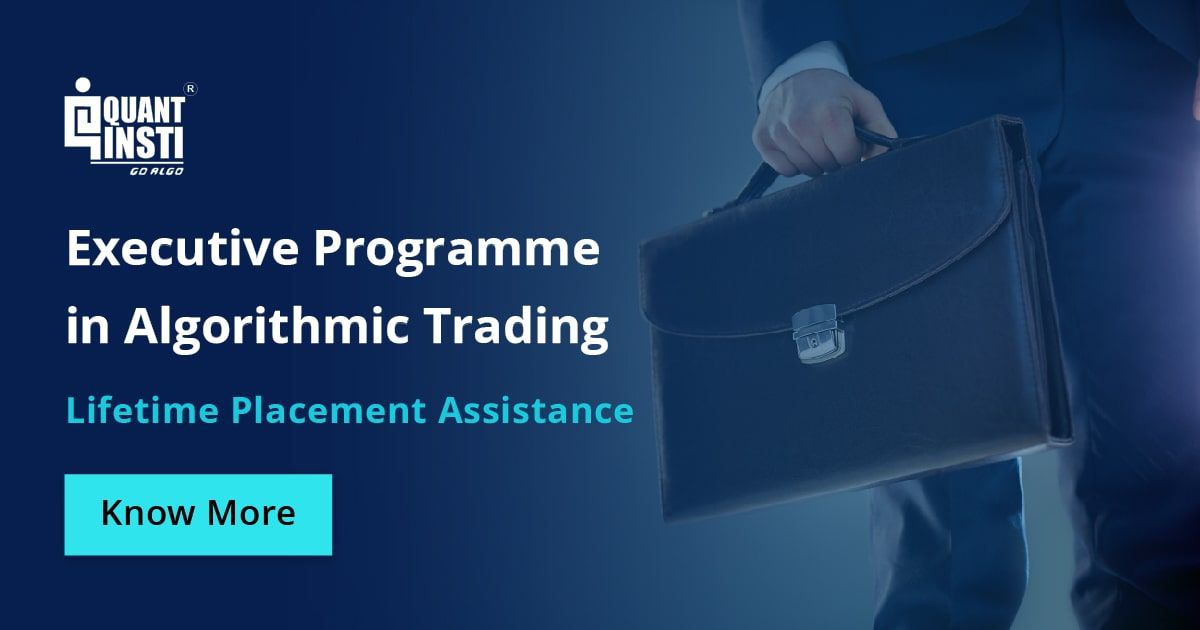By Viraj Bhagat
The rapidly growing domain of Algorithmic trading and Quantitative trading are demanding skilled individuals. This blog explains how EPAT is preparing quants for the present and future by bridging the void.
This blog covers:
And it is important that we realize the importance of staying up-to-date and ready to grab those opportunities.
While this is a time where I’d say, there is tremendous competition when it comes to jobs and careers. There is a rise of some remarkable opportunities which has captivated the global scenario.
While some have been quick to gain the necessary skills and adapt, some haven’t been so ‘lucky’.
In a recent report, it was stated that Citigroup Inc. is teaching its traders how to code, and its coders how to trade through their very own coding labs - Markets Acceleration Lab, citing the need for traders to add new skills to their arsenal as more activity moves towards the electronic trading channel.
Man Group Plc., the London-listed firm, uses technology like machine learning for trading $6-7 trillion a year and has reportedly used quantitative techniques on about two-thirds of its assets. Last year, Sandy Rattray, (Chief Investment Officer, Man Group Plc.) said:
Hedge funds have been hiring scientists and adopting quant strategies. This explains the necessity and urgency of utilising the opportunity and gaining those essential skills.
Following is the highlighted text from Axel Pierron’s research Workforce of the Future: Transplanting Technology Skill Sets to the Capital Markets (he is the co-founder and managing director of Opimas) that says:

He also added that by 2030, 66,000 jobs will be created in emerging technologies and data science.
These technology amalgamated domains require skilled hands to mould their rise, to train, to support and to evolve them. Which is in turn pushing corporates and tech giants towards hunting for skilled and talented individuals who are technology-driven, or market experts, leading to a rise in jobs.
Moreover, the retail algo trading in India space is rapidly expanding. Individual traders across equities, derivatives, and commodities are finding growing opportunities in this segment. With people also opting for setting up their own Algorithmic Trading desks, and services pertaining to Algorithmic Trading. The ease of access to technology has also made trading for individuals a very lucrative option.

And it isn’t limited to India, in various countries, you’ll see such rising requirements for quants globally. As reported by BusinessInsider,
Following is a list of just some of the job roles that are prevalent in the Algorithmic Trading and Quantitative Trading domain along with estimated salary figures.
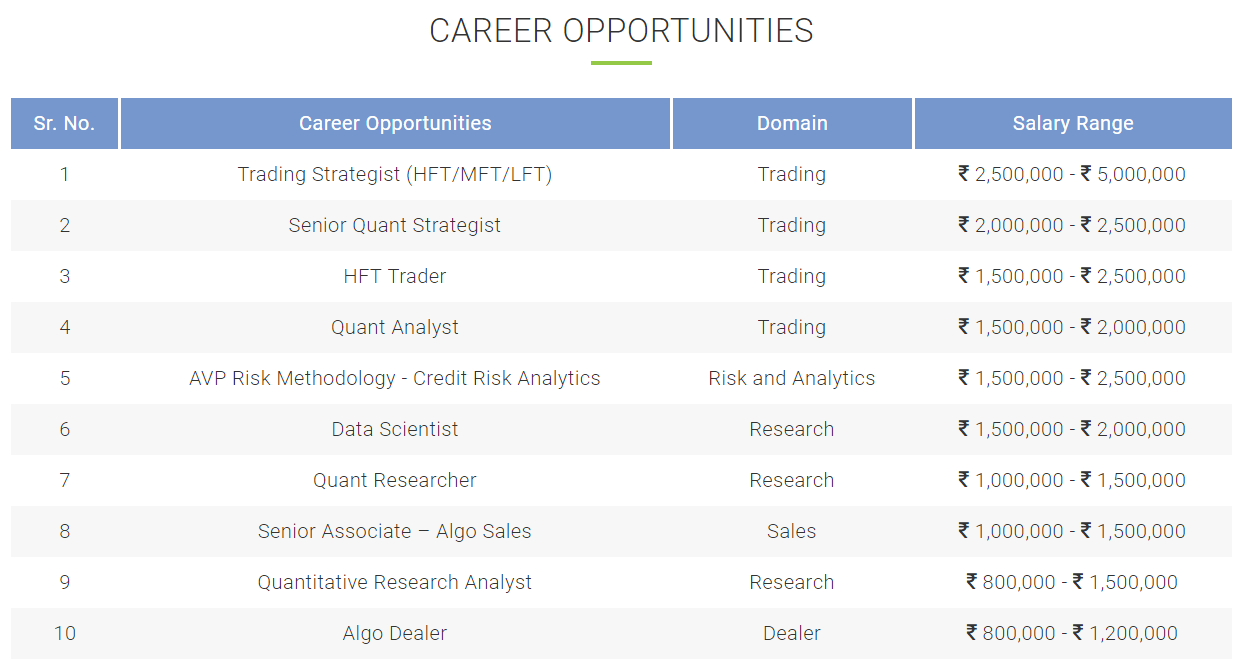
More content: How Much Salary Does a Quant Earn?
This indicates that there are indeed the right opportunities for the right skilled and promising candidates.
If this recent survey of the best jobs in banking is to be believed, Quantitative Trading jobs ranks only second in their survey, which is quite amazing.
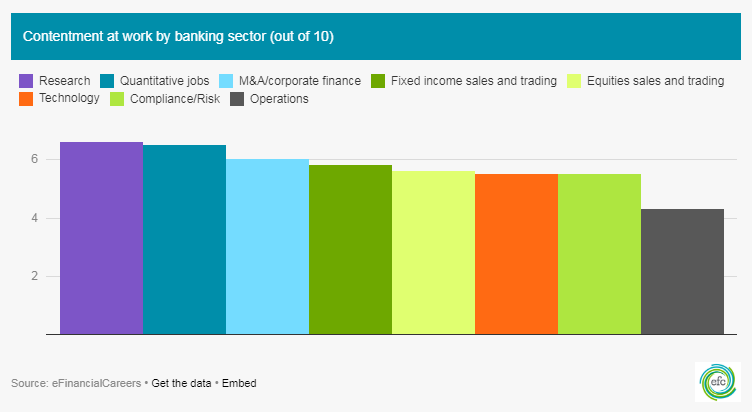
So, let me get this straight. There are desirable jobs and opportunities being created, while some already exist. Interesting.
Now, what could be the reason that they're not getting grabbed as fast?
It is all about the skills.
People are eager and they jump on to just any course without looking at the curriculum and if at all that course is worth the money.
What needs to be understood that there is a need, a requirement in the domain of algorithmic trading and quantitative trading, and there is a void of skilled individuals that are forming faster than what the industry can compensate for.
The industry is growing too fast, and the talent to suffice this need is limited and slow. Many are not aware of the underlying career opportunities that await them.
Skills are that ‘X’ factor.
In this month, Python is ranking #3 among the top-most programming language on the TIOBE Index. It is also worth noting that Python ranks at #4 on the StackOverflow 2019 survey.
About a year ago, Bloomberg reported that Citibank Inc. made it necessary for its employees to learn Python. Now, this makes you wonder, looking at this,
What if your employer, deeming the need of the hour, puts up the same policy?
Wouldn’t it help to be ready?
In recent news, WorldQuant hosted the Women Who Quant competition in collaboration with advocacy groups and has now moved on to hiring 50 of them as research consultants.
This insightful report Quantitative Finance Year In Review - 2019 quotes the following:
There is also a question of reliability and dependability on such courses that demand huge fees. One should thoroughly check if the institutes are accredited, certified, or have associations with some reputed bodies.
Some are freely available while others offer some serious premium content at affordable rates. And learning from apps seems to have become the “thing” nowadays.
This begs the question:
Well, the authentic classroom experience is a rare find as the education model has changed to quite some extent when it comes to courses for training and certifications. Many classrooms simply exist on the cloud devoid of any support mechanism and lack the human interaction that we are used to experiencing.
Learners often complain that the curriculum lacks, or what was presented before buying the course isn’t what they got. Some times, the curriculum isn't up to the mark and one might end up missing learning a good chunk.
With learning, follow countless questions. But in the automated courses, who answers them when immediately required? In a few cases, queries are rarely addressed.
In limited or subscription-based models/courses one can’t go back to the courses to revise and keep up with the rapidly changing tech and trends.
So, how does one succeed?
QuantInsti is a pioneer Algorithmic Trading Research and Training Institute, conducting professional programmes in this rapidly growing domain and we are associated with CPD certification.
Over the decade of our existence, we have trained and certified some brilliant individuals from various domains of Mathematics, Statistics, Core sciences, Computer science, Engineering, Operations, Research, Business administration, Finance & Economics.
Here’s a breakdown of our audience and their professions: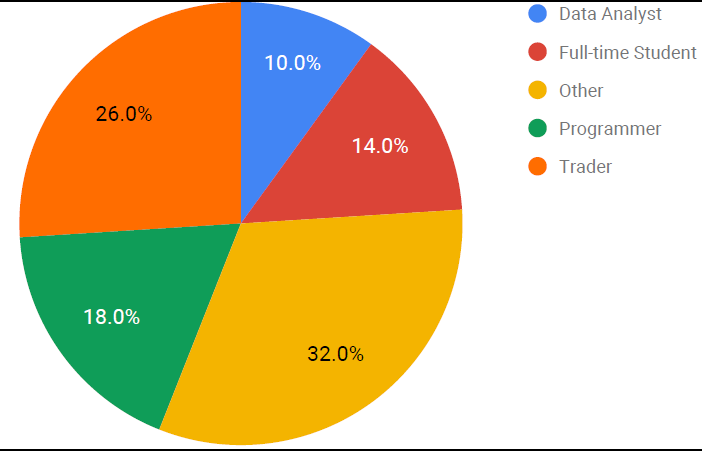 And here’s a breakdown of their domain of expertise
And here’s a breakdown of their domain of expertise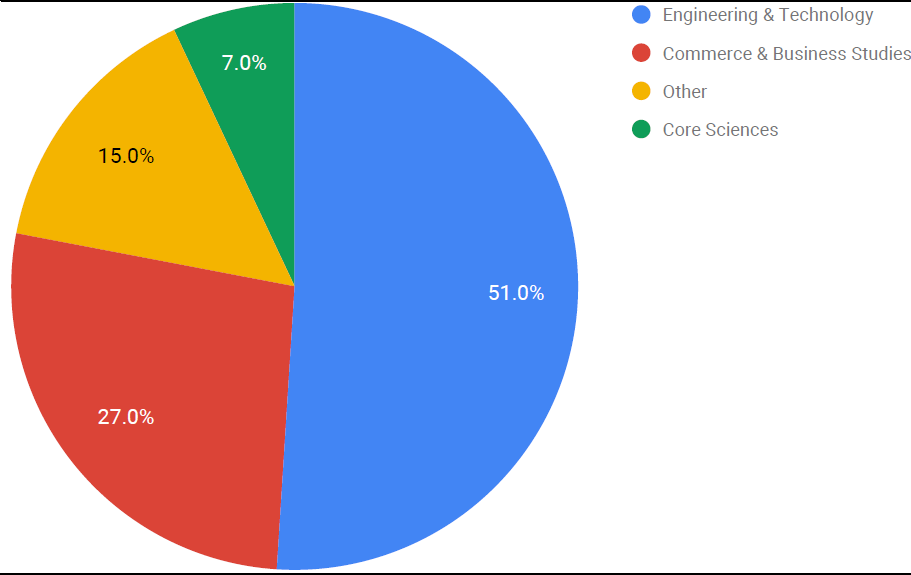 This is directly opposed to the standard beliefs that only Traders can learn Algorithmic Trading.
This is directly opposed to the standard beliefs that only Traders can learn Algorithmic Trading.
Almost half of our audience has an engineering or a technical background.
Surprised yet?
Expert guidance and mentorship are required from people who are from the domain and have a thorough experience, know-how and know the ins and outs of it. These are the right people who would guide you and shape your career. But although it sounds good, one must agree that it is very tough to grab hold of industry practitioners and market makers.
Adapting to, or learning about the field of Algo Trading requires close assistance and demands mentorship.
At QuantInsti, we realised the need for providing the power to individuals to tap into this massive spurt of Algo Trading. And that gave rise to the Executive Programme in Algorithmic Trading (EPAT®).
Industry Experts, Stalwarts, Academicians, Traders and Market Practitioners are onboard our faculty bandwagon. Our associations with Dr. Ernest Chan, Dr. Gautam Mitra, Rajib R. Borah, Dr. Yves Hilpisch, Dr. Euan Sinclair and other eminent personalities open up a global opportunity for all participants and also entails them to exclusive guest lectures and events.
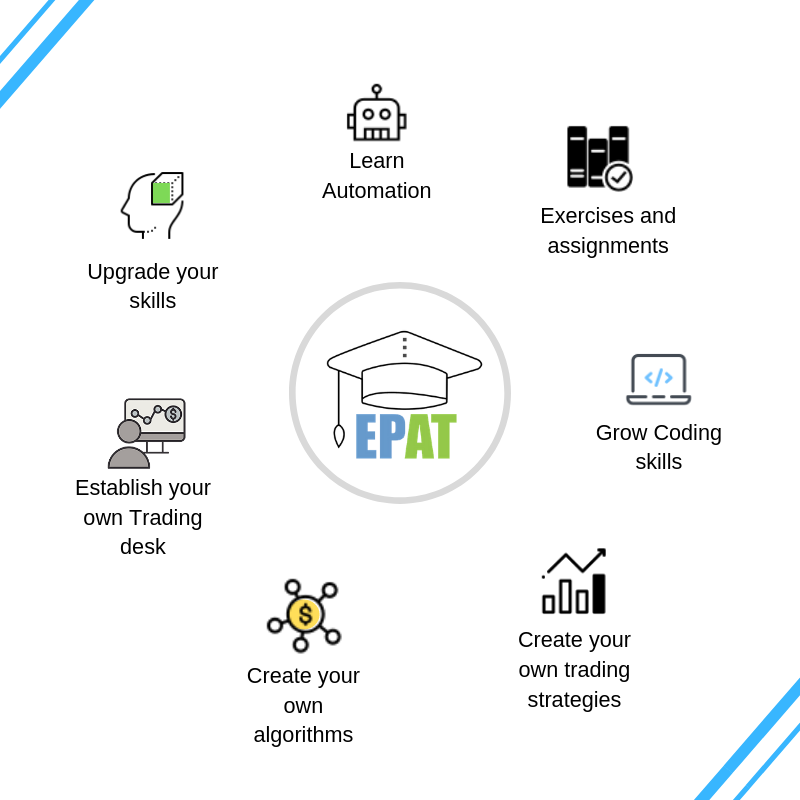
We not only support learning by supporting some remarkable initiatives like the FTS Eligibility, but we also encourage students to be a part of this domain by supporting educational loans, providing student aid, as well as offering a merit-based Scholarship.
We make this is a highly valuable asset for you - high value for money and opportunity to learn along with your full-time job.
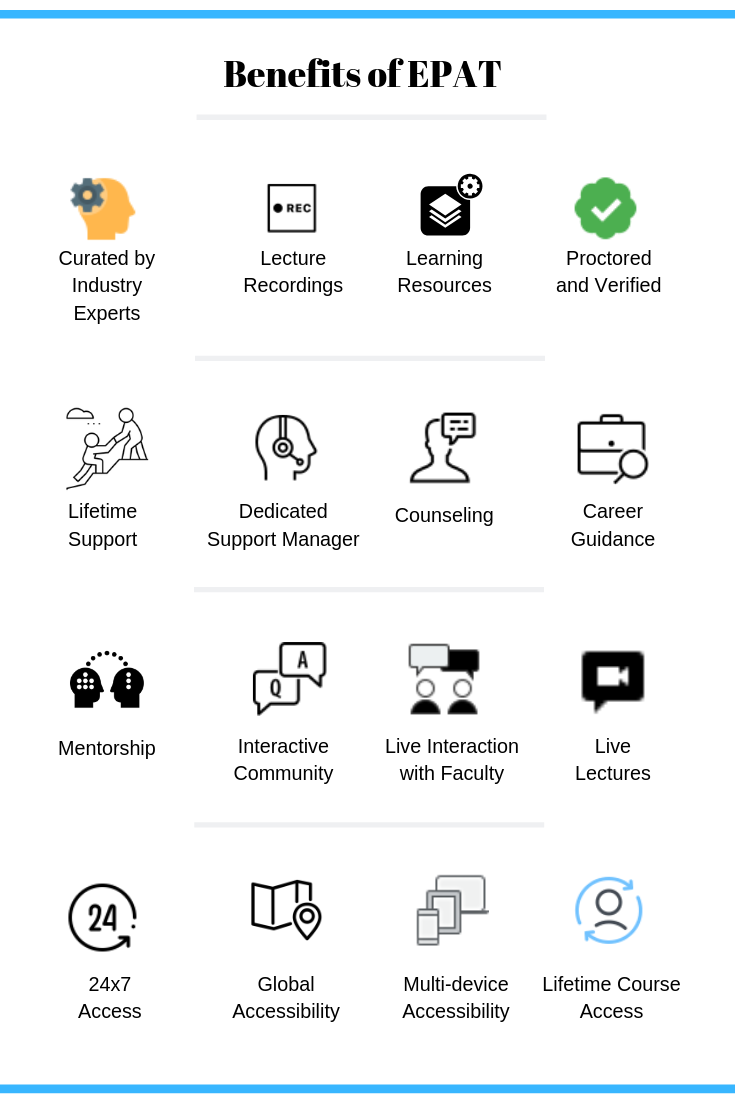
EPAT has gone on to create many success stories, helped many individuals pursue their dreams of becoming Algo Traders and continues to do so. While some have gone on to be placed successfully in the domain, some have enhanced their learning and some have even established their very own algorithmic Trading desks.
We, at QuantInsti aim too continue to share the knowledge and awareness of this rapidly growing domain of Algorithmic trading through our algo trading course, through various educational initiatives, promoting learning, conducting webinars and providing online resources like our blogs.
Disclaimer: All data and information provided in this article are for informational purposes only. QuantInsti® makes no representations as to accuracy, completeness, currentness, suitability, or validity of any information in this article and will not be liable for any errors, omissions, or delays in this information or any losses, injuries, or damages arising from its display or use. All information is provided on an as-is basis.
The rapidly growing domain of Algorithmic trading and Quantitative trading are demanding skilled individuals. This blog explains how EPAT is preparing quants for the present and future by bridging the void.
This blog covers:
- Embracing and Incorporating Technology in Trading
- Jobs and Opportunities are coming - I kid you not!
- If there are jobs, where are the right candidates?
- Job, Careers and the missing factor ‘X’
- Make learning an experience
- Empowering the Minds
- Excellence is the key
- Cherish the Benefits
And it is important that we realize the importance of staying up-to-date and ready to grab those opportunities.
While this is a time where I’d say, there is tremendous competition when it comes to jobs and careers. There is a rise of some remarkable opportunities which has captivated the global scenario.
While some have been quick to gain the necessary skills and adapt, some haven’t been so ‘lucky’.
Embracing and Incorporating Technology in Trading
There are some terrific changes occurring in the markets globally that are sculpting the way for technology and its use in trading, be it technological advancement or implementation of laws and regulations pertaining to Trading.In a recent report, it was stated that Citigroup Inc. is teaching its traders how to code, and its coders how to trade through their very own coding labs - Markets Acceleration Lab, citing the need for traders to add new skills to their arsenal as more activity moves towards the electronic trading channel.
“The intersection of quantitative, technical and markets knowledge is critical,”- said Deirdre Dunn, the bank’s regional head of markets for North America
Man Group Plc., the London-listed firm, uses technology like machine learning for trading $6-7 trillion a year and has reportedly used quantitative techniques on about two-thirds of its assets. Last year, Sandy Rattray, (Chief Investment Officer, Man Group Plc.) said:
“You can either protest and block all the streets like they do a lot in Europe, or you can say, ‘What the heck am I going to do about this change’ and get on with it and incorporate these new technologies”Similarly, the role of Sentiment Analysis and Natural Language Processing cannot be ignored, as this article explains.
Hedge funds have been hiring scientists and adopting quant strategies. This explains the necessity and urgency of utilising the opportunity and gaining those essential skills.
Jobs and Opportunities are coming - I kid you not!
Following are some eye-opening revelations from some renowned names that should be proof enough.“Algorithms struggle to separate the signal from the noise.- Prof Chyng Wen Tee, Singapore Management University’s Lee Kong Chian School of Business.[1]
You still need a human to step in”
"Spotting, communicating and managing risk are the skills that ready graduates for a wide array of industries."- Antoine Jacquier, the director of the MSc in mathematics and finance at Imperial College London. [2]
“In Europe, meanwhile, the regulation that followed the financial crisis has made students with technical and legal knowledge a prized asset”- Olivier Bossard, executive director of the MSc Finance programme at HEC Paris business school.[3]
Following is the highlighted text from Axel Pierron’s research Workforce of the Future: Transplanting Technology Skill Sets to the Capital Markets (he is the co-founder and managing director of Opimas) that says:

He also added that by 2030, 66,000 jobs will be created in emerging technologies and data science.
These technology amalgamated domains require skilled hands to mould their rise, to train, to support and to evolve them. Which is in turn pushing corporates and tech giants towards hunting for skilled and talented individuals who are technology-driven, or market experts, leading to a rise in jobs.
Moreover, the retail algo trading in India space is rapidly expanding. Individual traders across equities, derivatives, and commodities are finding growing opportunities in this segment. With people also opting for setting up their own Algorithmic Trading desks, and services pertaining to Algorithmic Trading. The ease of access to technology has also made trading for individuals a very lucrative option.
If there are jobs, where are the right candidates?
A simple google search reveals numerous Quant Jobs in India.
And it isn’t limited to India, in various countries, you’ll see such rising requirements for quants globally. As reported by BusinessInsider,
“Algorithmic trading is forecast to grow 11% a year and reach $19 billion in 2024”.According to Finance Magnates,
"Among algorithmic market applications, the stock markets segment is expected to exhibit the highest growth rate."All of this is promising that the future of algorithmic trading seems pretty bright.
Following is a list of just some of the job roles that are prevalent in the Algorithmic Trading and Quantitative Trading domain along with estimated salary figures.

More content: How Much Salary Does a Quant Earn?
This indicates that there are indeed the right opportunities for the right skilled and promising candidates.
If this recent survey of the best jobs in banking is to be believed, Quantitative Trading jobs ranks only second in their survey, which is quite amazing.

So, let me get this straight. There are desirable jobs and opportunities being created, while some already exist. Interesting.
Now, what could be the reason that they're not getting grabbed as fast?
It is all about the skills.
Job, Careers and the missing factor ‘X’
There is an increasing demand for Quants with tech skills, especially those with programming and AI skills. As a result, we have observed that there are even ‘speciality’ courses popping up every now and then for training quants, and for teaching skills essential to the domain.People are eager and they jump on to just any course without looking at the curriculum and if at all that course is worth the money.
What needs to be understood that there is a need, a requirement in the domain of algorithmic trading and quantitative trading, and there is a void of skilled individuals that are forming faster than what the industry can compensate for.
The industry is growing too fast, and the talent to suffice this need is limited and slow. Many are not aware of the underlying career opportunities that await them.
Skills are that ‘X’ factor.
In this month, Python is ranking #3 among the top-most programming language on the TIOBE Index. It is also worth noting that Python ranks at #4 on the StackOverflow 2019 survey.
About a year ago, Bloomberg reported that Citibank Inc. made it necessary for its employees to learn Python. Now, this makes you wonder, looking at this,
What if your employer, deeming the need of the hour, puts up the same policy?
Wouldn’t it help to be ready?
In recent news, WorldQuant hosted the Women Who Quant competition in collaboration with advocacy groups and has now moved on to hiring 50 of them as research consultants.
This insightful report Quantitative Finance Year In Review - 2019 quotes the following:
- There is a heavy investment in R&D for electronic trading.
- Investment banks are focussing on statistical modelling and development utilising machine learning and statistical analysis to build algorithms.
- Candidates with experience in HFT, or market microstructure research to build optimal execution algorithms are being hired
- Most vital languages to know - C++ and Python
- Main programming language of choice for data and research - Python
- Most in-demand skills - Machine Learning techniques and data processing
- In-demand knowledge - Market microstructure and algo execution model development and research; and a strong understanding of finance
Make learning an experience
People resort to various means of learning. Today you have the YouTube, ebooks, self-learning portals, forums, communities, and whatnot.There is also a question of reliability and dependability on such courses that demand huge fees. One should thoroughly check if the institutes are accredited, certified, or have associations with some reputed bodies.
Some are freely available while others offer some serious premium content at affordable rates. And learning from apps seems to have become the “thing” nowadays.
This begs the question:
Are classroom lectures passe?
Well, the authentic classroom experience is a rare find as the education model has changed to quite some extent when it comes to courses for training and certifications. Many classrooms simply exist on the cloud devoid of any support mechanism and lack the human interaction that we are used to experiencing.
Learners often complain that the curriculum lacks, or what was presented before buying the course isn’t what they got. Some times, the curriculum isn't up to the mark and one might end up missing learning a good chunk.
With learning, follow countless questions. But in the automated courses, who answers them when immediately required? In a few cases, queries are rarely addressed.
In limited or subscription-based models/courses one can’t go back to the courses to revise and keep up with the rapidly changing tech and trends.
So, how does one succeed?
Empowering the Minds
The best method for learning is to Learning by Doing. One can specialize in a strategy/asset class through project work and with hands-on coding, paper trading knowledge, use of Excel for Data Analysis one grasps the basics of trading.QuantInsti is a pioneer Algorithmic Trading Research and Training Institute, conducting professional programmes in this rapidly growing domain and we are associated with CPD certification.
Over the decade of our existence, we have trained and certified some brilliant individuals from various domains of Mathematics, Statistics, Core sciences, Computer science, Engineering, Operations, Research, Business administration, Finance & Economics.
Here’s a breakdown of our audience and their professions:


Almost half of our audience has an engineering or a technical background.
Surprised yet?
Excellence is the key
How can you excel?Expert guidance and mentorship are required from people who are from the domain and have a thorough experience, know-how and know the ins and outs of it. These are the right people who would guide you and shape your career. But although it sounds good, one must agree that it is very tough to grab hold of industry practitioners and market makers.
Adapting to, or learning about the field of Algo Trading requires close assistance and demands mentorship.
At QuantInsti, we realised the need for providing the power to individuals to tap into this massive spurt of Algo Trading. And that gave rise to the Executive Programme in Algorithmic Trading (EPAT®).
Industry Experts, Stalwarts, Academicians, Traders and Market Practitioners are onboard our faculty bandwagon. Our associations with Dr. Ernest Chan, Dr. Gautam Mitra, Rajib R. Borah, Dr. Yves Hilpisch, Dr. Euan Sinclair and other eminent personalities open up a global opportunity for all participants and also entails them to exclusive guest lectures and events.
- Individual Traders can create new trading strategies under the mentorship, benefit from data providers and brokers and learn to take your strategies into the live markets.
- Job Seekers can benefit from 100+ placement tie-ups, as we provide them with the perfect platform to showcase their quant skills.
- Business Leaders, Entrepreneurs and Aspirers can learn about setting up their own Algo trading desk, or hire their team with Corporate tie-ups, and network with other entrepreneurs through dedicated alumni cell. Establishing your own trading desk is also encouraged.

We not only support learning by supporting some remarkable initiatives like the FTS Eligibility, but we also encourage students to be a part of this domain by supporting educational loans, providing student aid, as well as offering a merit-based Scholarship.
We make this is a highly valuable asset for you - high value for money and opportunity to learn along with your full-time job.
Cherish the Benefits
Here are some of the benefits that you can avail as an EPATian.
EPAT has gone on to create many success stories, helped many individuals pursue their dreams of becoming Algo Traders and continues to do so. While some have gone on to be placed successfully in the domain, some have enhanced their learning and some have even established their very own algorithmic Trading desks.
We, at QuantInsti aim too continue to share the knowledge and awareness of this rapidly growing domain of Algorithmic trading through our algo trading course, through various educational initiatives, promoting learning, conducting webinars and providing online resources like our blogs.
“Chance favours only the prepared mind.” - Louis PasteurSo, let me ask. Are you prepared?
Disclaimer: All data and information provided in this article are for informational purposes only. QuantInsti® makes no representations as to accuracy, completeness, currentness, suitability, or validity of any information in this article and will not be liable for any errors, omissions, or delays in this information or any losses, injuries, or damages arising from its display or use. All information is provided on an as-is basis.

